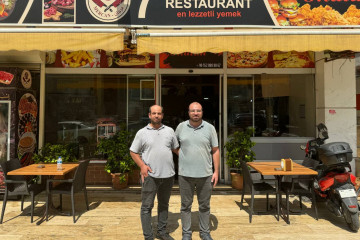

Fed up with the constant news from Gaza, Salah Khubieh, after months of frustration, woke up one morning this past July and called his friend and business partner, Musa Ciçek, before heading to their restaurant.
“Take the ladder with you,” he told him over the phone. When they met, Salah explained they would take down the restaurant sign and replace it with a new one.
“From now on, we will rename this place ‘7 October,’” Salah said.
The name is a clear reference to the beginning of the conflict in Gaza, “a memorial of the genocide that’s been unfolding before our eyes for almost a year now,” Salah told The New Arab.
The restaurant – a small take-out shop with a few tables and chairs – is located in the central, bustling Ordu Caddesi area of Gaziantep, a major city along the south-eastern border between Turkey and Syria.
Today, it hosts around half a million war refugees who have settled here because of the geographical and cultural proximity to their homeland.
Salah, a Syrian refugee from Damascus, crossed into Turkey in 2019, after a bad leg injury that he couldn’t manage to treat properly back home.
In Syria, the 45-year-old owned an iron factory, which he lost to the war; but when he moved to Gaziantep he had to reinvent himself, like most Syrians.
He never expected to enter the food industry. However, many refugees in Gaziantep — often called the ‘Turkish capital of gastronomy’ because of its renowned food scene — have opened their own shawarma or falafel shops to create a sense of home.
Musa, on the other hand, is originally from Diyarbakir. He moved to Gaziantep eight years ago to work as a translator during the peak of the refugee crisis.
He met Salah through his work, and the two quickly became friends. When Salah had trouble registering his business as a Syrian national in Turkey, Musa kindly offered to put it under his name and become a business partner.
Commitment to the Palestinian cause
In late 2021, during a difficult period for businesses emerging from the pandemic, the two proudly opened al-Shalan Lokanta, serving Syrian and Turkish street food. They had no idea that, a year later, their bond would deepen as they discussed their frustration with the unpunished horrors occurring in Gaza.
“We realised that we both deeply cared about the Palestinian cause and wanted to raise awareness and show our support, even from afar,” 39-year-old Musa explains.
Earlier this year, a restaurant in Jordan renamed itself ‘7 October’. However, the restaurant quickly changed its name after an Israeli official called for condemnation from the Jordanian authorities. The change was made within a few days despite claiming it was a misunderstanding and that the name referred to the owner’s daughter’s graduation date.
“But I knew it was just an enforcement against freedom of expression because of political reasons,” Salah says.
“For months we have wondered what we could do to amplify the voices of Palestinians with our simple means. After reading about this episode, we decided there needed to be at least another ‘7 October’ restaurant in the world.”
Syria and Gaza united in struggle
Over the past few months, Turkish people have protested in the streets against the Israeli invasion of Gaza and Turkey has officially stepped up support for the Palestinians. Likewise, Syrians have also shown their full support to the Palestinian cause by pouring aid into Gaza, despite the hardships of their own country.
With a majority of Arab and Turkish citizens, it's common to see pro-Gaza stickers and Palestinian flags displayed from balconies throughout the city, especially in the neighborhood around the restaurant.
At the 7 October restaurant, the TV in the background is always on, airing either re-runs of Bab al-Hara, a popular Syrian soap opera, or the news.
Syrian customers watch the news unfolding about Gaza while waiting to pick up their orders or munching shawarma by the counter and often comment on them together.
“As Syrians, we feel a strong connection to the Palestinians in Gaza. It’s not just because of our shared Arab or Muslim identity, but because we understand the suffering of living under bombardment while the world remains largely indifferent,” says Saher Khalil, a refugee from Aleppo who has been living in Gaziantep since 2016.
“It’s heartbreaking to see that happening to them as well, and we obviously identify ourselves with their situation.”
Although elsewhere al-Shalan’s name change might have been seen as controversial, Salah emphasises, “We did not choose this name to celebrate Hamas’ terrorist attack. Our intention was to ensure people remember the beginning of Palestine’s new Nakba and to mark this event in history.”
Siding with humanity
Last July, southeastern Turkey experienced a surge of violence and racism against Syrians, who now face increased risks of deportation following last year’s earthquakes and national elections. However, coming together over the Palestinian cause “definitely drew us closer,” says Ciçek.
He adds that there could be no better place than Gaziantep, Turkey’s kitchen, to send a political message through food. “Here food holds a vital place in people’s lives: it’s culture, it’s home and it’s also politics,” Musa says.
“Taking a stance through a restaurant and its food means everything here.”
As Salah greets new customers ordering a falafel platter, the two express their readiness to defend their bold decision, even in the face of potential threats to shut down their restaurant.
“They will not silence us,” he adds. “Standing with Palestinians means siding with humanity.”
Stefania D'Ignoti is a freelance journalist covering migration and society in Italy and the Middle East.
Follow her on X: @stef_dgn







 Follow the Middle East's top stories in English at The New Arab on Google News
Follow the Middle East's top stories in English at The New Arab on Google News


